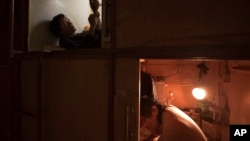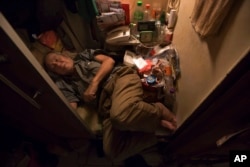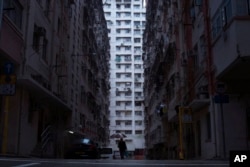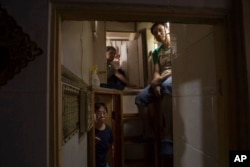Just a harbor away from a cluster of skyscrapers, in the poorest district in Hong Kong, Szeto, a resident who declined to give his full name due to security concerns, struggles to endure the heat inside his shoebox apartment. The heat wins.
"It's so stuffy," says the 47-year-old. "I felt like I couldn't breathe and had to go out."
Szeto shares his 6-square-meter apartment with nine other people in Hong Kong's infamous "sub-divided flats" because the territory's rental rates are among of the highest in the world.
Hong Kong's summer heat has been scorching, with July and September reaching record-high temperatures amid the region's most severe heat waves since 1961.
Climatologists attribute the frequency and severity of heat waves around the world to global warming. The United Nations says that it will only increase in the decades to come.
In Hong Kong, the heat waves have pushed residents like Szeto into a more desperate situation, according to social worker Esther Wu.
"We did a survey [a] few months before, and we found that in cubicles in subdivided units, the temperature is much more hotter than outside," Wu said, adding it's "like five to six degrees hotter than outside because of the bad design of the structure of the inadequate housing."
The sweltering summer has worsened the high-income financial hub's longstanding housing crisis. Currently, some 200,000 residents live in what the government called "inadequate housing" — they are often subdivided apartments, rooftop shacks, and cage homes, among others. They average in size only about 4 square meters per person — smaller than the size of a prison cell.
The temperatures inside these apartments were up to nine degrees higher than on the city streets this summer, according to a survey from a local NGO. The units are poorly ventilated; many have no windows, and some are illegal structures built with metallic materials, making these dwellings similar to a "sauna room," the NGO said in a statement.
Fai Yeung lives in an apartment subdivided into eight studios in the Sham Shui Po district. There is not much space left after fitting a double bunk bed into the windowless space, with the top bunk storing most of his personal belongings. He usually sits on his bunk bed with the fan hanging on the wall circulating some much-needed air, while his air-conditioner remains idle during daytime.
"I usually go out during the daytime. I go out to parks to chat with my friends," the 67-year-old told VOA News.
Power cost too high
Yeung only switches on his air-conditioner when he sleeps — a practice commonly seen in subdivided flats with air-conditioners, according to Wu.
"Most [subdivided apartment] residents have to use a lot of electricity when they turn on the air conditioners, leading to a high utility cost. This cost might be set by the landlords but not the electricity provider. To save such costs, the residents usually go outside instead of staying at home and switching on the air-cons," Wu told VOA.
The average utility cost each month amounts to HK$638, on top of the HK$5,000 average rent for such apartments, taking up more than 40% of tenants' household income and becoming what Wu calls a "burden" to the tenants. About 40% of those receiving social security allowance are paying rent higher than the monthly allowance and 70% say the heat has piled additional financial pressure on them, according to a report by the Society for Community Organization, a Hong Kong-based non-governmental and human organization.
Hong Kong law bans landlords from charging tenants electricity and water costs more than the bill from the providers, but more than 75% of these property contracts still state a different price for utility each month.
Tenants tend not to hold these landlords of subdivided flats accountable, as only about half are able to contact their landlords directly, and many cannot afford to lose the roof over their heads by taking legal action, Wu said.
As a result, the sweltering heat this summer has pushed these residents out of their homes, and even when they are back for sleeping, they face more serious nuisances, such as bedbug infestation, fueled by the summer heat and humidity.
These issues drove some to sleep in the corridor instead of their own beds. On his way out to the shopping mall, Szeto told VOA that even though he has an AC unit in his subdivided apartment, it doesn't function well.
"It isn't cool enough and the room is still stuffy. The temperature inside the room is about the same as outside," Szeto said.
Heat shelters
To cope with the urban heat, the government has opened 18 heat shelters for those in need, but Wu said these shelters only operate at night and can't help subdivided apartment residents much.
Wu, social workers and some tenants called for a high-temperature subsidy to pay for the cost of using air-conditioners. The recommendation is not new — the government has been aware of such requests for several years, but so far, a subsidy has not been implemented.
The city aims to reach carbon neutrality by 2050 and a coal-free power generation by 2035, but electricity still makes up over 60% of Hong Kong's greenhouse gas emissions.
Social worker Wu urged the government to also tackle illegal structures and double down on regulating the design of subdivided flats and inadequate housing.
"There's no window, there's no AC in the [subdivided] units. The living environment isn't good. If they can do more checks and sue landlords for not providing flats with windows, that'd be much better," she said.
In the long run, Wu said the government has to boost the housing supply. Many subdivided flat residents are waiting for public housing units, but it takes on average six years for a Hong Konger to be allocated one, and more than four years for single elderly people, government data shows.
The government has planned to provide 20,000 transitional housing for those waiting for their public housing units — a far cry from the more than 150,000 households who submitted their application.
While passing a spot in the corridor where some of his roommates choose to sleep, Szeto said he's not hopeful conditions will improve.










